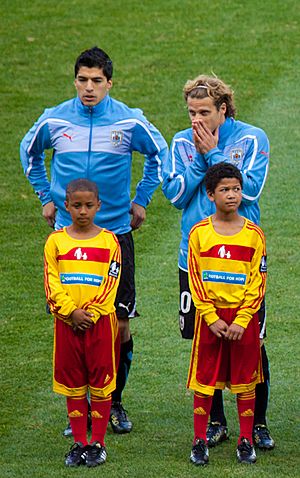Diego Forlán facts for kids
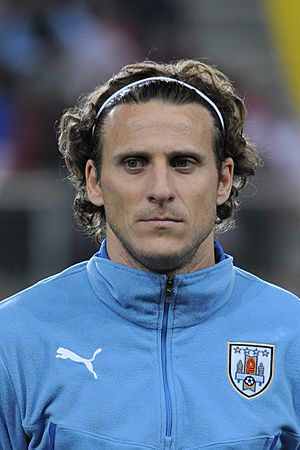
Forlán lining up for Uruguay in 2014
|
|||||||||||||||||||
| Personal information | |||||||||||||||||||
|---|---|---|---|---|---|---|---|---|---|---|---|---|---|---|---|---|---|---|---|
| Full name | Diego Forlán Corazo | ||||||||||||||||||
| Date of birth | 19 May 1979 | ||||||||||||||||||
| Place of birth | Montevideo, Uruguay | ||||||||||||||||||
| Height | 1.80 m (5 ft 11 in) | ||||||||||||||||||
| Position(s) | Striker | ||||||||||||||||||
| Youth career | |||||||||||||||||||
| 1990–1991 | Peñarol | ||||||||||||||||||
| 1991–1994 | Danubio | ||||||||||||||||||
| 1994–1997 | Independiente | ||||||||||||||||||
| Senior career* | |||||||||||||||||||
| Years | Team | Apps | (Gls) | ||||||||||||||||
| 1997–2002 | Independiente | 80 | (37) | ||||||||||||||||
| 2002–2004 | Manchester United | 63 | (10) | ||||||||||||||||
| 2004–2007 | Villarreal | 106 | (54) | ||||||||||||||||
| 2007–2011 | Atlético Madrid | 134 | (74) | ||||||||||||||||
| 2011–2012 | Inter Milan | 18 | (2) | ||||||||||||||||
| 2012–2014 | Internacional | 34 | (10) | ||||||||||||||||
| 2014–2015 | Cerezo Osaka | 42 | (17) | ||||||||||||||||
| 2015–2016 | Peñarol | 30 | (8) | ||||||||||||||||
| 2016 | Mumbai City | 11 | (5) | ||||||||||||||||
| 2018 | Kitchee | 7 | (5) | ||||||||||||||||
| Total | 525 | (222) | |||||||||||||||||
| International career | |||||||||||||||||||
| 1999 | Uruguay U20 | ||||||||||||||||||
| 2002–2014 | Uruguay | 112 | (36) | ||||||||||||||||
| Managerial career | |||||||||||||||||||
| 2020 | Peñarol | ||||||||||||||||||
| 2021 | Atenas | ||||||||||||||||||
|
Medal record
|
|||||||||||||||||||
| *Club domestic league appearances and goals | |||||||||||||||||||
Diego Forlán Corazo (born May 19, 1979) is a famous Uruguayan footballer who played as a striker. He is now a football manager. Many people think Forlán was one of the best forwards of his time.
He won the Pichichi Trophy twice and the European Golden Shoe twice for scoring the most goals in Europe. With the Uruguay national team, he was a star at the 2010 FIFA World Cup. He was one of the top scorers with five goals and won the Golden Ball as the best player in the tournament. He also scored the "Goal of the Tournament."
Forlán started playing football as a young player in Uruguay for Peñarol and Danubio. Then he joined an Argentine club called Independiente. After playing well for four years, he moved to England to play for Manchester United in 2002. He helped United win the Premier League in 2003 and the FA Cup in 2004.
In 2004, Forlán moved to Spain to play for Villarreal. In his first season there, he won the Pichichi Trophy. Later, he joined Atlético Madrid and became the league's top scorer again. He was the first player since Ronaldo to win the Pichichi Trophy twice. Forlán scored in Atlético's win in the 2010 Europa League final. He later played for Inter Milan in Italy and Internacional in Brazil. After playing in Japan, Uruguay, India, and Hong Kong, Forlán stopped playing professional football in August 2019.
Forlán also had a great international career. He scored 36 goals for Uruguay between 2002 and 2015. This included six goals in FIFA World Cup tournaments. In 2011, he played his 79th international game, breaking a record. In 2013, he became the first Uruguayan to play 100 games for his country. Forlán was Uruguay's all-time top scorer for a while until Luis Suárez scored more goals two years later.
Contents
Early Life and Family Background
Diego Forlán was born on May 19, 1979, in Montevideo, Uruguay. He grew up in the Carrasco neighborhood. His family was quite large, including his parents, three brothers, a sister, and other relatives.
His father, Pablo Forlán, was also a famous football player for Uruguay. His grandfather, Juan Carlos Corazzo, played football in Argentina. So, football was a big part of his family's history.
Forlán went to different schools and learned English from a young age. As a child, he played both tennis and football. He often played football on the streets with his friends.
In 1991, Forlán's sister, Alejandra, was badly hurt in a car accident. This caused financial problems for his family. Famous footballer Diego Maradona helped them raise money. After this, Forlán focused more on football, hoping to help his family with the costs of his sister's treatment.
Club Football Journey
Starting Out in South America
Forlán loved Peñarol as a boy and played for their youth team. He also played for Danubio. In 1995, when he was 16, he tried out for a French club, Nancy, but did not get a contract.
He then joined Independiente in Argentina. He quickly moved up through their youth teams. Forlán made his first professional game on October 26, 1998. He scored 37 goals in 80 league games for Independiente. His goal-scoring skills caught the eye of European clubs.
Playing for Manchester United
In January 2002, Sir Alex Ferguson signed Forlán for Manchester United in England. He made his first game for United on January 29, 2002. Forlán scored his first goal for United in September 2002 from a penalty kick.
One of his most famous moments was in December 2002 when he scored two goals against their rivals, Liverpool. He even took off his shirt to celebrate one goal and struggled to put it back on! Manchester United won the Premier League title in 2003. Forlán scored six goals that season, making him the third-highest scoring striker for the club.
He continued to play for Manchester United until August 2004. Even after he left, United fans would sing songs about his goals against Liverpool.
Success in Spain with Villarreal and Atlético Madrid
On August 21, 2004, Forlán joined Villarreal in Spain. In his first season, he scored 25 goals and won the Pichichi Trophy for being the top scorer in La Liga. He also shared the European Golden Boot award. Villarreal even reached the semi-finals of the UEFA Champions League in 2006.
In 2007, Forlán moved to Atlético Madrid. He joined after their captain, Fernando Torres, left. Forlán quickly became a key player, forming a strong partnership with striker Sergio Agüero. In May 2009, he scored a hat-trick (three goals) against Athletic Bilbao. This helped him win the La Liga Pichichi Trophy and the European Golden Boot for a second time. He scored an amazing 32 goals in 33 games that season.
In the 2009–10 season, Forlán helped Atlético reach the finals of both the Europa League and the Copa del Rey. He scored the winning goal in the Europa League semi-final against Liverpool. In the final against Fulham, Forlán scored two goals, helping Atlético win 2–1. He was named the best player of the match.
Later Career and Retirement
After Atlético Madrid, Forlán played for Inter Milan in Italy in 2011. He then moved to Internacional in Brazil in 2012. He helped Internacional win the Campeonato Gaúcho in 2013, scoring nine goals.
In 2014, he moved to Japan to play for Cerezo Osaka. He scored a hat-trick for them in 2015. In 2015, he returned to his boyhood club, Peñarol, in Uruguay. He helped them win the championship title in his only season there.
Forlán also played for Mumbai City in India in 2016, where he scored another hat-trick. His last club was Kitchee in Hong Kong in 2018. He helped Kitchee win the Hong Kong Premier League. A year after leaving Kitchee, Forlán announced he was retiring from professional football in August 2019.
International Career for Uruguay
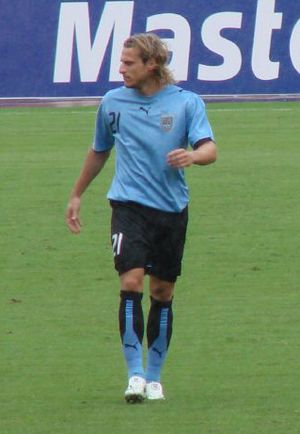
Forlán played his first game for the Uruguayan national team in 2002. He scored his 100th game for Uruguay in 2013. In 2011, he became Uruguay's all-time top scorer in official matches.
2010 FIFA World Cup Star
At the 2010 FIFA World Cup in South Africa, Forlán was incredible. He scored five goals, including two against the host nation, South Africa. He scored a fantastic free kick against Ghana in the quarter-finals. He also scored a long-range goal against the Netherlands in the semi-finals.
In the third-place play-off against Germany, Forlán scored a brilliant volley. This goal was chosen by FIFA as the "Goal of the Tournament." He also hit the crossbar with a free kick right at the end of the game. Forlán won the Golden Ball as the best player of the tournament. He was also one of the top scorers with five goals.
Copa América Victory
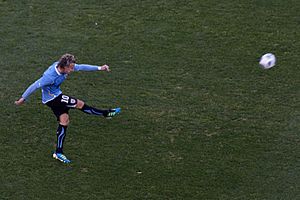
In 2011, Forlán scored two goals in the final against Paraguay. This helped Uruguay win their 15th Copa América title. His father and grandfather had also won this tournament with Uruguay, making it a special family achievement.
Retirement from National Team
Forlán played his last game for Uruguay in 2014 at the 2014 FIFA World Cup. He announced his retirement from the national team on March 11, 2015. He played 112 games for Uruguay and scored 36 goals.
Playing Style
Diego Forlán was a very talented and smart football player. He was good with the ball and could score goals with both feet. He was known for his powerful and accurate shots from far away. He was also good at taking free kicks and penalty kicks.
Forlán could play in different positions, like a main striker or a supporting forward. He was also good at passing and helping other players score. People admired his leadership and how long he played at a high level.
Coaching Career
After retiring as a player, Forlán became a football manager. In December 2019, he was named manager of his old club, Peñarol. He later managed Atenas in 2021.
Tennis Career
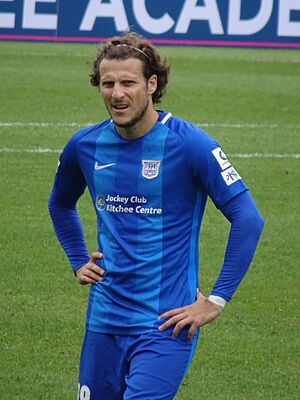
Before becoming a professional footballer, Diego Forlán was a promising junior tennis player. He continued to play tennis after he stopped playing football in 2019. Since July 2023, he has been playing on the ITF Masters professional tennis tour. He is now a ranked player in different age groups.
In June 2024, Forlán reached the quarterfinals of a big tennis tournament in Peru. He even played in his first professional ATP tournament in Montevideo in 2024, playing doubles.
Personal Life
Diego Forlán comes from a family of footballers. His father, Pablo, and his maternal grandfather, Juan Carlos Corazzo, both played football professionally. Forlán is also related to goalkeeper Cristopher Fiermarin.
His nickname is Cachavacha, which is a witch character from an Argentine cartoon. Besides his native Spanish, Forlán also speaks English. He is ambidextrous, meaning he uses his right hand for writing but his left hand for tennis. In football, he could use both feet equally well.
Forlán is a founding member of Fundación Alejandra Forlán. This organization, led by his sister Alejandra, works to promote safer driving. He is married to Paz Cardoso, and they have three sons and a daughter.
Honours
|
Manchester United
Villarreal
Atlético Madrid
Internacional
Peñarol
Kitchee
|
Uruguay
Individual Awards
|
Images for kids
See also
 In Spanish: Diego Forlán para niños
In Spanish: Diego Forlán para niños
 | Aaron Henry |
 | T. R. M. Howard |
 | Jesse Jackson |


